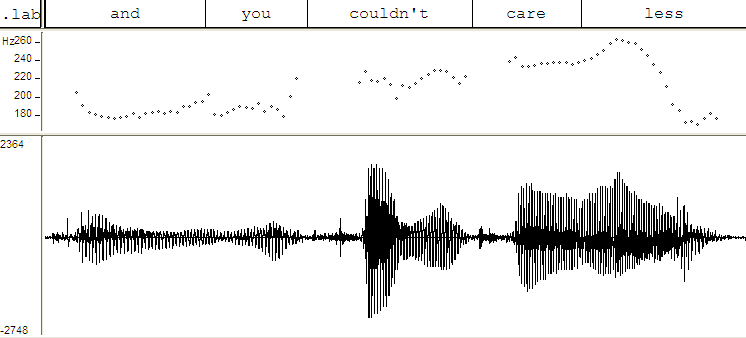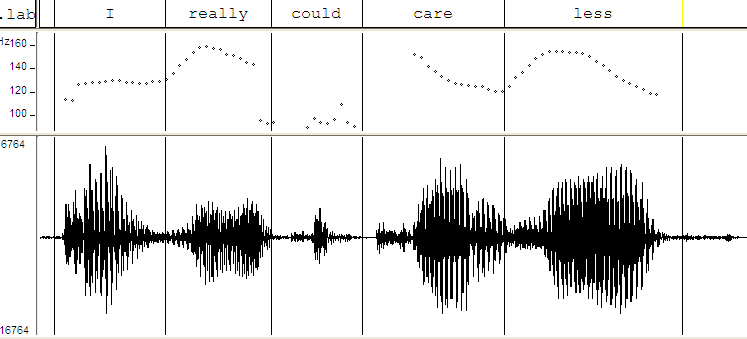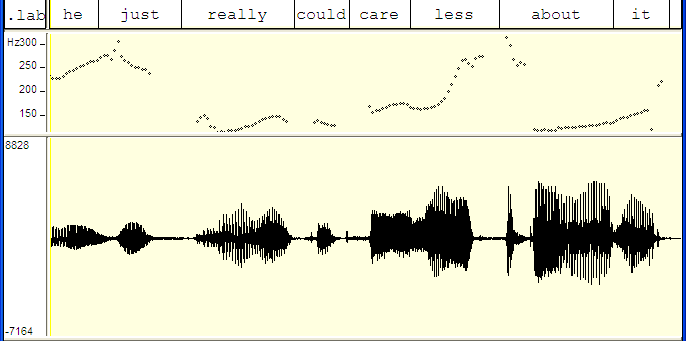July 16, 2004
Speaking sarcastically?
Sarcasm is "a cutting, often ironic remark intended to wound", or "A form of wit that is marked by the use of sarcastic language and is intended to make its victim the butt of contempt or ridicule". People often use "sarcasm" to mean something like "irony with an edge", and specifically the type of irony that involves saying the opposite of what you mean.
That's clearly the sense that Steve Pinker had in mind when he wrote that the expression I could care less "is not illogical, it's sarcastic." I agree that the phrase is not a mistake in logic, but I think that Pinker is wrong about the sarcasm. And I'm pretty sure that he was wrong to argue that the melody and stress of the phrase convey -- to those who don't have a "tin ear" -- that it's being used sarcastically.
There are plenty of utterances that are used to mean the opposite of what they literally say, and there's a lot to say about how this works. I could care less might be an example of this -- though I don't think so -- but its stress and pitch don't bear on the question. There's no such thing as sarcastic intonation. Not in English, anyhow, and I doubt that any other language has such a thing either. Nor is there sarcastic stress, sarcastic pitch, sarcastic voice quality or any other mode of speech production that means "what I'm saying now is the opposite of what I mean."
Here's the backstory. Eric Bakovic got righteously peeved at Richard Lederer for saying that the common expression "I could care less" is illogical. In defense of the users of this colloquial expression, Eric quoted Steve Pinker's argument that "if these dudes would stop ragging on teenagers and scope out the construction, they would see that their argument is bogus ... ['I could care less'] is not illogical, it's sarcastic." Pinker claimed that the sarcasm is clear from the way the two phrases are (always?) pronounced: "The melodies and stresses are completely different." In particular, he suggests that the clue to sarcasm is to be found in an "ostentatiously mannered intonation".
As I just said, and as I wrote in an earlier post, I'm doubly skeptical about this. FIrst, I'm skeptical that people who say "I could care less" are being sarcastic. This is partly from listening to them, and thinking about it in context, but it's also an intuition based on the fact that I'm one of these people, and I don't feel sarcastic or ironic when I use the expression. Second, I don't believe that sarcastic or ironic utterances are inevitably or even normally performed with an "ostentatiously mannered intonation." That's certainly one option, but it's not the only option, and I'm not sure it's the commonest one. In general, I don't think that irony has any particular implications for speech performance; nor do I think that there's any mode of performance that signals irony.
So in this case, Pinker is just as "bogus" as Lederer. The expression could care less, as the OED puts it, is just a "U.S. colloq. phr.". Pinker's story about sarcasm, melody and stress is an interesting idea, but his description of the prosodic contrast between the two expressions is empirically false, and it assumes that that sarcasm can be marked by prosody in English, which is also false. Furthermore, there's a better alternative story about the origins of "could care less", which was laid out some time ago by John Lawler and others.
In this post, I'm going to say a bit more about the prosodic issues. I'll say more about the alternative (non-sarcasm) explanation for "could care less" in a later post.
Pinker's story about "I could care less" can be found in his book The Language Instinct, and in a 1994 New Republic article.
Here's his picture of the difference in "melodies and stresses":
| COULDN'T care | I | ||||||||||||||||||||||||||||||||||||||||||||||||||||||
| LE | CARE | ||||||||||||||||||||||||||||||||||||||||||||||||||||||
| i | ESS. | LE | |||||||||||||||||||||||||||||||||||||||||||||||||||||
| could | ESS. |
Pinker doesn't tell us what he means by this notation. But I'll assume that he's using two common informal conventions: that words in capital letters are more stressed than words in lower-case letters, and that placing letters typographically higher on the page means that the corresponding pieces of words are higher in pitch.
Let's take stress first. Breaking out the caps=stress part of his notation, and using color to reinforce the case information, we have:
i COULDN'T care LESS vs. I could CARE LESS
There are two questions to ask about this. First, is it true? and second, does it have anything to do with sarcasm or irony?
I believe that the answers are "it's partly true, sometimes", and "no, it has nothing to do with sarcasm or irony in any systematic way."
It's partly true because of the following tendencies in speech rhythm:
- Pronouns (like "I") are usually unstressed and therefore rhythmically weak
- Verbs (like "care") are usually weak, and monosyllabic auxiliaries or modals (like "could") even weaker; in fact the latter are often completely reduced and turned into clitics
- Not and contractions involving not usually want to be strong
- Alternating rhythmic patterns are preferred
- Starting a phrase with multiple weak syllables is avoided (especially in reading isolated sentences)
So for a phrase like "I couldn't care less", a natural pattern is w(eak) s(strong) w(eak) s(strong), which is nicely alternating, allows the pronoun to be weak, the contracted negation to be strong, and the verb care to be weaker than less. This can of course be overidden by contrast ("Kim is worried, but I couldn't care less") and by many other factors.
As for "I could care less", let's put it aside for a minute and look instead at a perfectly normal, unidiomatic, unironic phrase like "I could buy more". A natural stress pattern is "I could BUY MORE" or maybe "I could buy MORE".
Yes, this notation is ill defined. I didn't choose it here -- in another post, maybe we can talk about how to do better. The point here is that could winds up relatively weak, from a rhythmic point of view, and in fact is likely to be completely reduced. The initial pronoun "I" is likely to be rhythmically stronger than could, at least when you're reading the sentence in an artificial context, because of the desire for alternation and the desire to avoid multiple weak syllables at the start of the phrase. In real conversational usage, the pronoun would probably also be very weak, unless it was being used contrastively. The final word more needs to be at least as strong as buy, unless it's weakened by a contrastive structure like "I could MAKE more or I could BUY more).
But "I could BUY MORE" is exactly the stress pattern that Pinker cites for "I could CARE LESS"! That's because the rhythmic options for "I could care less" are exactly the same as they are for "I could buy more", or any other phrase involving similar words in a similar structure. Irony (or "sarcasm") has zip to do with it. There's no "sarcastic stress" or rhythm here.
What about the pitch? Is that sarcastic?
Well, the first thing to say is that the norms of American English intonation make many pitch contours available for "could care less", and also for "couldn't care less". It's not true that the particular patterns that Pinker cites are inevitable, and it's not even true that they're somehow normal or preferred. It's hard to evaluate his overall claim, since he makes it informally and doesn't say which aspects of the pitch contour are critical to "an ostentatiously mannered intonation" and which are not. But I think think we can still reject the theory (that something about the pitch contour tells us that "could care less" is ironic or sarcastic), because a similar distribution of pitch contours can be found on phrases of similar form that are totally lacking in irony. I won't try to prove that, but I'll give some examples that I hope will show you how such an argument would go.
Here's Pinker's picture again:
| COULDN'T care | I | ||||||||||||||||||||||||||||||||||||||||||||||||||||||
| LE | CARE | ||||||||||||||||||||||||||||||||||||||||||||||||||||||
| i | ESS. | LE | |||||||||||||||||||||||||||||||||||||||||||||||||||||
| could | ESS. |
He shows "I couldn't care less" with "couldn't" as the highest pitch and "less" as the lowest. But here's the first roughly comparable example I found, where "less" is the highest pitch, with "couldn't" just a bit up over the subject (which in this case is "you").
[Time in the display runs from left to right; under the transcription there are two panels, first the pitch contour (time function of fundamental frequency of the voice) and then the waveform (time function of deviations from ambient air pressure). The display is a screenshot of the open-source program WaveSurfer.]
[You can click on the display to play the audio clip].
The sentence-wide context, by the way, is
So if you hate somebody, you'll let them do whatever they feel like, and you couldn't care less.
and the clip is taken from a telephone conversation in the 2003 Fisher collection.
As for the phrase "I could care less", Pinker shows it with "I" as the highest point, and "care" close behind, and "could" and "less" at the bottom. But in the example below ("I really could care less"), the highest points are "really" and "less", with "I" a significant amount lower, "care" also lower (in terms of the salient pitches in its high-amplitude center) and "could" very low in pitch and almost completely reduced.
[Again, you can click on the picture to listen to the audio clip, and see whether you think the intonation is "ostentatiously mannered" or in any other way prosodically marked as sarcastic. I don't think so.]
As I explained above, the reduction of "could" is very much like what might happen in a phrase like "I could buy more". (I should also note that the raised pitch values at the very start of "could" are probably caused by the initial voiceless stop [k] in could -- this effect of consonant voicing on pitch has often been involved in tonogenesis, as in the history of Vietnamese and Chinese).
Here's another example: "He just really could care less about it", where "he" and "less" are the highest points, with "care" only a little up over "could":
As we look at more pitch contours for other examples of "could care less" and "couldn't care less", we'll find that a wide range of pitch contours can be employed for each of them; that the two sets of contours overlap considerably; and (most important) that the contours are just like those that we find on similar examples (like "could buy more" or "couldn't find Lee") where the meaning is semantically compositional and pragmatically unironic.
There are plenty of interesting things to say about these pitch contours, but irony and sarcasm are not an essential part of the discussion. Nor do we need to talk about "ostentatiously mannered intonation". Prosodically, "could care less" is just like any other phrase involving similar words in a similar structure in a similar rhetorical context. And neither the structural analysis nor the rhetorical analysis needs to invoke sarcasm or irony.
I enjoy Steve Pinker's writing, and his analyses are often insightful. But in this case, I think he owes William Safire and Richard Lederer -- the "language mavens" whom he accused of "[a] tin ear for stress and melody, and an obliviousness to the principles of discourse and rhetoric" -- an apology.
Posted by Mark Liberman at July 16, 2004 08:09 AM


